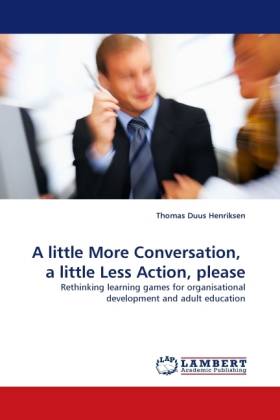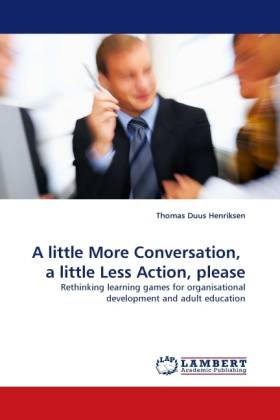
- Afhalen na 1 uur in een winkel met voorraad
- Gratis thuislevering in België vanaf € 30
- Ruim aanbod met 7 miljoen producten
- Afhalen na 1 uur in een winkel met voorraad
- Gratis thuislevering in België vanaf € 30
- Ruim aanbod met 7 miljoen producten
A little More Conversation, a little Less Action, please
Rethinking learning games for organisational development and adult education
Thomas Duus Henriksen
Paperback | Engels
€ 98,45
+ 196 punten
Omschrijving
Learning games are often considered a very innovative approach for facilitating organizational development and adult learning processes. Unfortunately, the use and development of such games tend to rely on very traditional pedagogical principles; that learning games should be fun, make a vast academic content available and present it in a realistic manner. To revitalize learning games as innovative tools, a study of the EIS Simulation is presented to critically readdress the learning process of such games, concluding that to be truly innovative, learning games should try to break with those traditions. From a post-structuralist approach to science, a comprehensive and exhaustive review on learning game literature is presented. This theoretical approach is complimented by a qualitative, empirical study of the EIS Simulation, using a labographic methodology to readdress the underlying questions on learning games and how to incite participation in learning games, how to use games for creating learning processes with adults, and how such game-based experiences are to be understood by its participants to promote learning.
Specificaties
Betrokkenen
- Auteur(s):
- Uitgeverij:
Inhoud
- Aantal bladzijden:
- 344
- Taal:
- Engels
Eigenschappen
- Productcode (EAN):
- 9783838355283
- Verschijningsdatum:
- 6/07/2010
- Uitvoering:
- Paperback
- Afmetingen:
- 153 mm x 228 mm
- Gewicht:
- 542 g

Alleen bij Standaard Boekhandel
+ 196 punten op je klantenkaart van Standaard Boekhandel
Beoordelingen
We publiceren alleen reviews die voldoen aan de voorwaarden voor reviews. Bekijk onze voorwaarden voor reviews.









